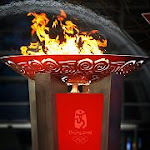
The Torchlike the rules. The Torch has its own rules. No 1 Rule is, Liberty.
China Issues 57 Rules
For Olympics Visitors
By GEOFFREY A. FOWLER and SKY CANAVES
June 3, 2008
HONG KONG -- The Beijing Olympics organizing committee issued a detailed handbook of ground rules for foreign visitors to this summer's Games. The 57 points address behavior from public drunkenness to political statements, a message that China won't be letting down its guard during the Games.
BEIJING 2008
In recent months, the government has reported crushing several attempted terrorist plots to disrupt the Games. It has increased supervision of foreigners in China by tightening rules for issuing visas and checking up on foreign residents already in the country.
Most of the guidelines issued Monday, phrased in a question-and-answer format -- and only in Chinese -- are restatements of existing laws and regulations. They stipulate that foreign visitors to China should carry passports and other official documents at all times. Visitors who plan to stay with friends or relatives in Beijing must register with local police within 24 hours.
Some of the guidelines are less weighty. Entertainment venues have to be closed between 2 a.m. and 8 a.m. Another guideline reminds visitors that "it is prohibited to sleep in public places," including airports, train stations and parks.
On sensitive issues such as public speech and protest, the rules offer no guidance beyond the vague prohibitions the government has offered in the past.
At major public venues, behavior that "disturbs order" is prohibited, the rules say. Inside Olympic venues, it is illegal to display "any religious, political, and ethnic slogans, banners, and other items."
People hoping to hold marches or demonstrations must apply to the police for permission, the rules say, but they don't explain where such protests will be allowed, if at all.
The Beijing Olympics organizing committee wasn't available for comment.
International human-rights groups and some athletes' organizations have expressed concern over the ability of participants and spectators to speak freely during the Games. In April, International Olympic Committee President Jacques Rogge said that "freedom of expression is something that is absolute" and is shared by athletes. But he also said that athletes are guests in China and would have to abide by Chinese law.
Write to Geoffrey A. Fowler at geoffrey.fowler@wsj.com and Sky Canaves at sky.canaves@wsj.com


No comments:
Post a Comment